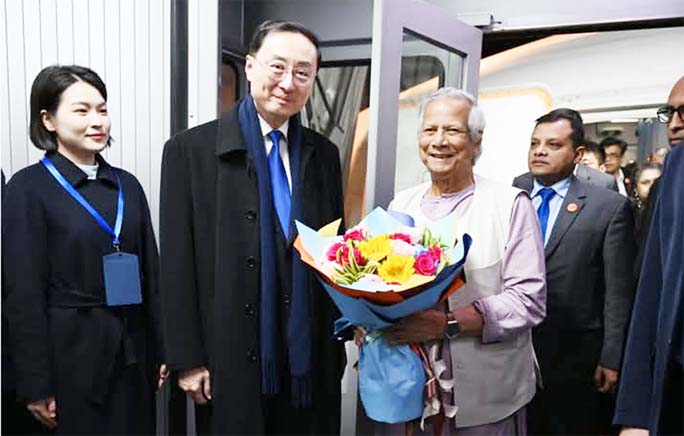Dhaka secures duty-free access from China till 2028

Staff Reporter :
China has confirmed that it will maintain duty-free and quota-free access for Bangladeshi goods until 2028, two years after Bangladesh transitions from a Least Developed Country (LDC) to a middle-income economy.
This was revealed by Chinese Vice-Premier Ding Xuexiang on Thursday during a meeting with Bangladesh’s Chief Adviser Professor Muhammad Yunus at the Boao Forum for Asia Annual Conference 2025 in Boao.
The meeting, which took place at the Bo’ao State Guest House and lasted over 30 minutes, focused on a range of bilateral issues.
Vice-Premier Ding expressed China’s commitment to launching free trade negotiations with Bangladesh and emphasised the significance of President Xi Jinping’s support for Professor Yunus’ visit.
He also voiced optimism about Bangladesh’s future progress under the leadership of Yunus.
China also pledged financial support for major infrastructure projects in Bangladesh, including the modernisation of Mongla Port and the Dasherkandi Sewage project.
Both nations reaffirmed their dedication to strengthening trade, investment, and cultural ties, as they mark the 50th anniversary of diplomatic relations.
In addition, Bangladesh requested China’s cooperation on various development initiatives.
These included a request to reduce the interest rates on Chinese loans from 3 per cent to between 1 per cent and 2 per cent, as well as waiving commitment fees for Chinese-funded projects.
In response, Vice-Premier Ding reiterated China’s decision to extend duty-free and quota-free trade privileges to Bangladesh until 2028 and expressed Beijing’s interest in initiating free trade talks with Dhaka.
Furthermore, China confirmed its support for Bangladesh’s acquisition of four ocean-going vessels for the state-run Bangladesh Shipping Corporation.
During the meeting, Professor Yunus also sought China’s assistance in relocating manufacturing industries to Bangladesh.
These industries include ready-made garments, electric vehicles, light machinery, high-tech electronics, chip production, and solar panels.
In a notable development, Chen Huaiyu, Chairman of the China Export-Import Bank, confirmed the bank’s readiness to facilitate the relocation of Chinese private manufacturers to Bangladesh.
Additionally, Professor Yunus reiterated Bangladesh’s strong commitment to the One-China policy, emphasising Dhaka’s pride in being the first South Asian nation to join the Belt and Road Initiative.
Vice-Premier Ding highlighted China’s ongoing trade engagement with Bangladesh, mentioning the protocol signed last year to import mangoes.
It was confirmed that Bangladesh’s mango exports to China will begin this summer, and China is also set to import other Bangladeshi products, including jackfruit, guava, and aquatic items, in a bid to reduce the trade imbalance.
China further pledged to increase educational opportunities for Bangladeshi students by offering more scholarships at Chinese universities, where thousands of Bangladeshi students are currently enrolled.
In a final assurance, China expressed its continued commitment to facilitating dialogue between Bangladesh and Myanmar to address the ongoing Rohingya crisis.
